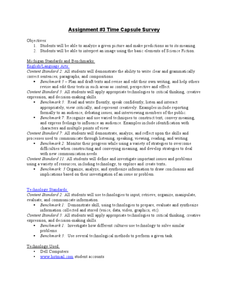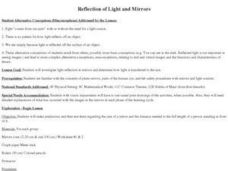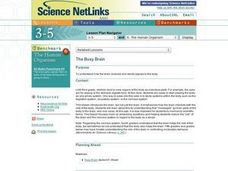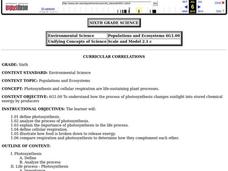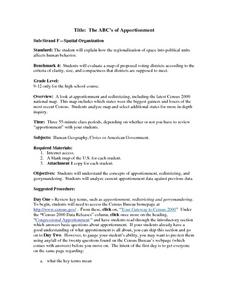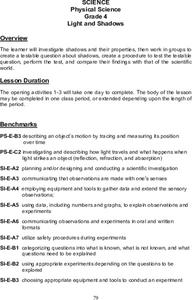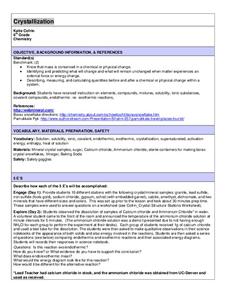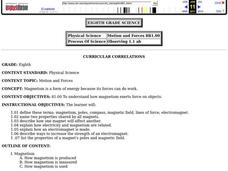Curated OER
Simple Machines
Here is an inventive plan that should get your young scientists excited! In it, groups of pupils test out the work done by six different simple machines. The machines are: the wedge, the lever, the inclined plane, the pulley, the screw,...
Curated OER
Time Capsule Survey
Here's a fun way to incorporate technology into your curriculum. E-mail each of your class members a picture and 10 questions about the photo. Individuals then imagine the story behind the image and e-mail back their responses. Although...
Curated OER
Alka-Seltzer Cannons
Fourth graders observe what is happening when an Alka-Seltzer tablet is placed in a clear cup of water. They observe the release of carbon dioxide gas. Pupils answer the question of how much as is released by observing the experiment...
Curated OER
Reflection of Light and Mirrors
Students address common misconceptions concerning reflection, light and mirrors. They investigate light reflection in mirrors and determine how light is transferred to the eye. In addition, they make predictions and then test them...
Curated OER
What is all the Fuss about?
Students brainstorm a list of science discoveries and inventions that they think are important. They work in small groups, students examine 1-3 science discoeries more closely. Each group needs a recorder, and they answer three...
Curated OER
The Busy Brain
Students explore biology by completing a human body worksheet. In this human brain lesson, students identify the different anatomy within the brain and the functions those pieces form. Students read an article about signals in the brain...
University of Minnesota
What's the Deal? Addiction Card Game
Addiction is a big deal! Playing a game of cards helps learners understand the concept of addiction. Through their analysis, they examine the potential for addiction and how it varies for each individual.
Curated OER
Focused Learning Lesson: Economics
Students review and discuss what skills and knowledge they need to make a decision about a career. They take a test to see which career they would most likely fit into.
Curated OER
Photosynthesis
Sixth graders are introduced to the process of photosynthesis by discussion and then by participating in an experiment. They then answer questions as independent practice project.
Curated OER
Science Experiments - The Low-down
Third graders discover the process thinking about science experiments, and why they are important. They work in small groups using incline planes and a small toy car to design one scientific question that can be answered through...
Curated OER
Plant Growth and Environment
Third graders bring to school various green plants and categorize them into plant leaves, stems, roots, and fruits. They answer the question, "How can you show there is starch in a plant?" and perform the iodine test and describe the...
Curated OER
Focused Learning Lesson: American History
Eleventh graders review the Progressive Movement and the Women's suffrage movement. They also review the changes from the end of World War I to the Great Depression.
Curated OER
The ABC's of Apportionment
Students are introduced to the terms of apportionment and redistricting. Using a Census map, they identify the states that had the highest and lowest numbers of change during the past ten years. They examine a map of voting districts and...
Curated OER
Light And Shadows
Fourth graders explore the properties of shadows. In pairs they trace each other's shadows in chalk and re-draw their shadow outlines every three hours, design their own shadow investigation, and complete various worksheets related to...
Curated OER
Weather, Data, Graphs and Maps
Students collect data on the weather, graph and analyze it. In this algebra lesson plan, students interpret maps and are able to better plan their days based on the weather reading. They make predictions based on the type of clouds they...
Curated OER
Variables and Controls in an Investigation
Seventh graders identify variables and controls in a paper airplane investigation. In this scientific method lesson, 7th graders conduct an experiment to determine the variables that affect the flight of paper airplanes. They design an...
Curated OER
What Do Plants Need?
Students experiment with plants. In this plant lesson plan, students research the needs of plants. Students determine if all plants have the same requirements for growth. In small groups, students experiment with different plants.
Curated OER
Cultural Contact and Exchange
Ninth graders examine the concept of cultural change. In this global studies lesson, 9th graders examine how cultures interact and impact one another. Students research the evolution of popular cultural exchanges.
Curated OER
Crystallization
Eighth graders analyze physical change in mass. In this chemistry lesson, 8th graders describe, measure and calculate the amount of physical change occurring in mass before and after the change. Students should be familiar with elements,...
Curated OER
Beach Cleanup at a Local Beach
Students participate in an environmental clean-up activity. In this environmental lesson, students travel to a local beach. Working in small teams, students collect trash from the local beach. Returning to school, students sort the trash...
Curated OER
Magnetic Discovery Bottle
Students examine how to conduct simple investigations and use simple equipment to gather data. For this magnet lesson students decide what types of objects are attracted to magnets.
Curated OER
Communicable Disease
Students use Palms, or handheld computers, and the Cooties software to enact the transmission of communicable diseases. They discuss incubation and immunity and collect and interpret data and figure out who was the "carrier "of a "disease."
Curated OER
Motion and Forces
Eighth graders define the terms: magnetism, poles, compass, magnetic field, lines of force, electromagnet. They name two properties shared by all magnets and describe how one magnet will affect another.
Curated OER
Habits of Mind
Students study tree leaves to complete the activity, For this tree leaf experiment lesson, students observe, measure, and sort tree leaves individually, in groups, and in relationship to the entire tree.

